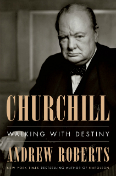 “Churchill: Walking with Destiny” is the most recent and perhaps the finest single-volume biography of Winston Churchill. Readers should not be daunted by the length of the book (982 pages) — it is detailed and thorough yet eminently readable and engrossing. Roberts covers Churchill’s remarkable life chronologically to support his central thesis that Churchill, throughout his life, was “walking with destiny” and destined to lead Great Britain in the darkest hours of World War II. Roberts makes excellent use of private diaries and correspondence to complement the public record. The book’s extensive detail serves to paint a complete, nuanced and objective portrait of Churchill. Even the footnotes enrich the reader’s understanding of the man. Roberts does not gloss over Churchill’s mistakes, yet the reader leaves with the clear impression that Churchill, though not perfect, was one of the truly great leaders in history.
“Churchill: Walking with Destiny” is the most recent and perhaps the finest single-volume biography of Winston Churchill. Readers should not be daunted by the length of the book (982 pages) — it is detailed and thorough yet eminently readable and engrossing. Roberts covers Churchill’s remarkable life chronologically to support his central thesis that Churchill, throughout his life, was “walking with destiny” and destined to lead Great Britain in the darkest hours of World War II. Roberts makes excellent use of private diaries and correspondence to complement the public record. The book’s extensive detail serves to paint a complete, nuanced and objective portrait of Churchill. Even the footnotes enrich the reader’s understanding of the man. Roberts does not gloss over Churchill’s mistakes, yet the reader leaves with the clear impression that Churchill, though not perfect, was one of the truly great leaders in history.
Three words that describe this book: Engrossing, remarkable, readable
You might want to pick this book up if: You like history or enjoy biographies.
-Jeff
This reader review was submitted as part of Adult Summer Reading. We will continue to share reviews throughout the year.
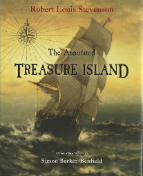 It’s likely that readers will already be familiar with the basics of this classic adventure tale. “Treasure Island” has become such a part of our cultural memory at this point, that few will be meeting Jim and Long John for the first time. I first read this book, as well as Stevenson’s “Kidnapped,” when I was young, and I remember being a little bored with it, but enjoyed the action scenes. I enjoyed it much more reading it as an adult. I found that I was much more interested in Stevenson’s descriptions of sailor life, even if they are highly fanciful, than when I was younger. In many ways, it was like visiting old friends again. I read it as a beach read when I vacationed this summer, and it was an excellent choice. As a fan of history, I found “The Annotated Treasure Island” to be thoroughly enlightening. I learned from the annotations while simultaneously enjoying Stevenson’s adventure story.
It’s likely that readers will already be familiar with the basics of this classic adventure tale. “Treasure Island” has become such a part of our cultural memory at this point, that few will be meeting Jim and Long John for the first time. I first read this book, as well as Stevenson’s “Kidnapped,” when I was young, and I remember being a little bored with it, but enjoyed the action scenes. I enjoyed it much more reading it as an adult. I found that I was much more interested in Stevenson’s descriptions of sailor life, even if they are highly fanciful, than when I was younger. In many ways, it was like visiting old friends again. I read it as a beach read when I vacationed this summer, and it was an excellent choice. As a fan of history, I found “The Annotated Treasure Island” to be thoroughly enlightening. I learned from the annotations while simultaneously enjoying Stevenson’s adventure story.
Three words that describe this book: adventure, pirates, sea tales
You might want to pick this book up if: You want a quick read that is full of adventure and interesting characters. Choose the annotated edition if you are also intrigued with 19th-century history and sailor life.
-Allen
This reader review was submitted as part of Adult Summer Reading. We will continue to share reviews throughout the year.
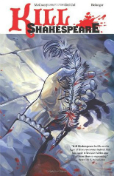
“Kill Shakespeare Volume 1: A Sea of Troubles” collects the first six Kill Shakespeare comic books and re-introduces us to some of Shakespeare’s most famous characters, but in new roles, as they hunt for Will Shakespeare, wizard god. Killing Will and securing his magical quill is the quest of the bad guys in power (Lady Macbeth, Richard III), while the rebellion, led by Juliet and backed by Othello, have put their faith in a Shadow King to find Will and save his followers. Being a fan of Shakespeare is not a requirement to enjoy the story — especially with the fantastic art by Andy Belanger — however, I suspect it’s more fun to know a bit about the characters and to pick up on the small Easter eggs, like the evening spent at the pub known as Midsummer Night’s Dram. Like all of Shakespeare, there’s comedy, murder, plotting, mayhem, romance, confusion, innuendo, and a great storyline with complicated characters. For those who struggle with the very idea of Shakespeare as an enjoyable reading experience, the artwork in this comic tells the story as much as the writing.
Three words that describe this book: Epic, Graphic, Literary
You might want to pick this book up if: You like twisted fairy tales such as those told in “Once Upon a Time” or the “Land of Stories.”
-Melody
This reader review was submitted as part of Adult Summer Reading. We will continue to share reviews throughout the year.

“To Kill a Mockingbird,” written from the point of view of a young girl in a small town in 1960s Alabama, is a poignant look at racism, classism and the basic human spirit. It certainly tackles difficult topics — unfortunately, these are topics that we are still struggling with today. However, seeing these issues through the eyes of a child gave it such a sweet simplicity that it gave me hope, like maybe if we all took a moment to think like young Scout Finch, we could really make things better. It was an excellent book that I look forward to reading again and again.
Three words that describe this book: Engaging, thought-provoking, charming
You might want to pick this book up if: I wanted to be reminded there are good people out there and that there is hope for change.
-Shelli
This reader review was submitted as part of Adult Summer Reading. We will continue to share reviews throughout the year.
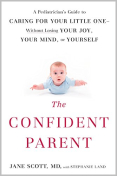 I loved “The Confident Parent” because it gives a global perspective on parenting, which I think is so important these days. As a parent in the US, it is easy to get anxious and stressed out while making sure your child gets the best start, succeeds in school, and is a contributing member of society. However, our children need us to lead by example and can sense our anxiety while we are trying to get everything “perfect.” This book includes a lot of great strategies and ideals that are a confluence of many cultures due to the author’s experience living and parenting in many parts of the world. My main takeaways from this book are to chill out, lead by example, and enjoy the journey.
I loved “The Confident Parent” because it gives a global perspective on parenting, which I think is so important these days. As a parent in the US, it is easy to get anxious and stressed out while making sure your child gets the best start, succeeds in school, and is a contributing member of society. However, our children need us to lead by example and can sense our anxiety while we are trying to get everything “perfect.” This book includes a lot of great strategies and ideals that are a confluence of many cultures due to the author’s experience living and parenting in many parts of the world. My main takeaways from this book are to chill out, lead by example, and enjoy the journey.
Three words that describe this book: global, practical, timely
You might want to pick this book up if: You are a parent, grandparent, or caregiver.
-Megan
This reader review was submitted as part of Adult Summer Reading. We will continue to share reviews throughout the year.
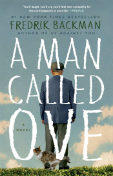 “A Man Called Ove” tugged on all of my heartstrings. The main character, Ove, is unlikeable, truly. He is old and grumpy, and takes it out on everyone that he encounters, including the person trying to sell him an iPad. When Ove gets new neighbors, he is infuriated. Not only are they annoying, but the husband cannot back up a trailer. Ove, out of frustration rather than just being helpful, decides to help the couple back up the trailer. This is where the book really takes off, and Ove’s relationships with the people around him change. Ove reminded me of my own grandpa, who was quite grumpy, and thought his way was the only way. Ove also reminds me of my dad, so this character holds a special place in my heart. The book surprised me, made me laugh out loud, and made me cry while staying up late to finish it.
“A Man Called Ove” tugged on all of my heartstrings. The main character, Ove, is unlikeable, truly. He is old and grumpy, and takes it out on everyone that he encounters, including the person trying to sell him an iPad. When Ove gets new neighbors, he is infuriated. Not only are they annoying, but the husband cannot back up a trailer. Ove, out of frustration rather than just being helpful, decides to help the couple back up the trailer. This is where the book really takes off, and Ove’s relationships with the people around him change. Ove reminded me of my own grandpa, who was quite grumpy, and thought his way was the only way. Ove also reminds me of my dad, so this character holds a special place in my heart. The book surprised me, made me laugh out loud, and made me cry while staying up late to finish it.
Three words that describe this book: Heart-wrenching, funny, and sad.
You might want to pick this book up if: If you are looking for something that will warm your heart while also breaking it, this is the book to pick up.
-Claire
This reader review was submitted as part of Adult Summer Reading. We will continue to share reviews throughout the year.
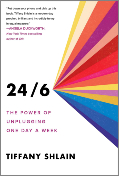 In the book “24/6: The Power of Unplugging One Day A Week,” Tiffany Shlain dives into the topic of technology use and the harmful impacts it has on us inside and out. Tiffany’s family takes a tech Shabbat every Friday evening to Saturday evening. The time and attention that they gain from unplugging is exactly what many of us want in our lives. I was so inspired that I implemented a modified tech Shabbat in my life before I was halfway through reading this book. I intend to have a full tech Shabbat every week from now on.
In the book “24/6: The Power of Unplugging One Day A Week,” Tiffany Shlain dives into the topic of technology use and the harmful impacts it has on us inside and out. Tiffany’s family takes a tech Shabbat every Friday evening to Saturday evening. The time and attention that they gain from unplugging is exactly what many of us want in our lives. I was so inspired that I implemented a modified tech Shabbat in my life before I was halfway through reading this book. I intend to have a full tech Shabbat every week from now on.
Three words that describe this book: Intriguing, Informative, Insightful
You might want to pick this book up if: You want to know more about taking time off from technology or why it’s so important to consider taking a tech break.
-Rebecca
This reader review was submitted as part of Adult Summer Reading. We will continue to share reviews throughout the year.
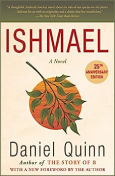 I love gorillas. As a small child my grandfather would take me to the B&I shopping center in Tacoma, Washington where I would watch Ivan the gorilla for hours. Even that young, I felt sorry for him, but I was, at the same time, happy to be able to wile away literal hours watching him. He was funny, clearly smart, and so incredibly intimidating. It was obvious he was intelligent and it forced me to think about humans relationship with animals in a way I otherwise may not have done.
I love gorillas. As a small child my grandfather would take me to the B&I shopping center in Tacoma, Washington where I would watch Ivan the gorilla for hours. Even that young, I felt sorry for him, but I was, at the same time, happy to be able to wile away literal hours watching him. He was funny, clearly smart, and so incredibly intimidating. It was obvious he was intelligent and it forced me to think about humans relationship with animals in a way I otherwise may not have done.
The book “Ishmael” follows the story of a gorilla named Ishmael who can “speak” telepathically, and communicate vast amounts of knowledge about the aforementioned relationship between men and animals. He advertises for students in the newspaper and the story is a chronicle of his tutoring of one such man that answers the advertisement.
I find it funny that the top three reviews of this book are not only one star, but are written by people that clearly took the book at it’s word and face value. Ishmael uses his time with the narrator to explain why man is on a crash course for self-destruction. While I don’t agree with every detail of Ishmael’s explanation, I do agree with the overall sentiment. Manifest destiny, etc. lend very heavily toward our precarious place in the circle of life. Our hubris and self importance will be our eventual downfall.
This is fiction and should be read as such, but it makes you think and makes you reexamine ideals and supposed knowledge. Isn’t that what all good fiction should do? If the reader is also entertained, it’s a win-win. My copy is littered with Post-It Notes. Ishmael says many, many things that I want to look into further — things I know, but want to know more about.
Three words that describe this book: Thought-provoking, relevant, insightful
You might want to pick this book up if: You question humanity’s place in the world.
-Kandice
This reader review was submitted as part of Adult Summer Reading. We will continue to share reviews throughout the year.
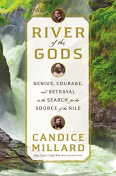 In the mid-19th century, explorers wondered about the location of the source of the Nile River. Two English adventurers, Burton and Speke, led an expedition to find the final answer. “River of the Gods” describes the extreme difficulties of their exploration including lack of funding, disappearing workers, near starvation and life-threatening illnesses that made the trek nearly impossible.
In the mid-19th century, explorers wondered about the location of the source of the Nile River. Two English adventurers, Burton and Speke, led an expedition to find the final answer. “River of the Gods” describes the extreme difficulties of their exploration including lack of funding, disappearing workers, near starvation and life-threatening illnesses that made the trek nearly impossible.
The even more interesting story was the personalities of these two men. Burton as the leader was six years older, more experienced, better able to communicate with the African people he hired, better able to understand their culture. Speke was more aristocratic, less interested in scientific investigations, more interested in hunting the African animals. Not surprisingly, although the two men had supported each other through near-death diseases, they returned to England bitter rivals. The resulting argument was nearly as interesting as the fascinating tale already told.
Candice Millard gives a detailed and seemingly historically accurate description of this expedition and its aftermath. An amazing story told in an amazing way.
Three words that describe this book: historical, exciting, adventure
You might want to pick this book up if: You enjoy true tales of adventure; you like geography; you like descriptions of interpersonal relationships and how they affect outcomes.
-Anonymous
This reader review was submitted as part of Adult Summer Reading. We will continue to share reviews throughout the year.
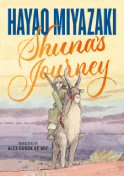 “Shuna’s Journey” is a parable about societies that lose control of what sustains them. In this case, as one might expect of Hayao Miyazaki, what’s lost is a connection to the natural world, particularly to agriculture.
“Shuna’s Journey” is a parable about societies that lose control of what sustains them. In this case, as one might expect of Hayao Miyazaki, what’s lost is a connection to the natural world, particularly to agriculture.
The main and titular character, Shuna is a prince from a village in the periphery whose people have retained this connection, living impoverished agrarian lives. He desires a better life for his people, but unlike the manhunters and city dwellers seen elsewhere who live in symbolically lifeless deserts and enrich themselves with the labor of slaves stolen from the periphery, Shuna understands that that life must come from the natural world — from the fruits of agriculture. He seeks a better cereal crop, the golden grain that sustains the city, shipped in husked and lifeless from the land of the gods. A journey through geological time into that land proves surreal and, almost literally alien, full of lavishly illustrated horrors and wonders that Shuna only escapes with the aid of slaves he freed previously in his journey.
The story is a striking tale of courage and renewal. Despite the fact that it wears its origin as a Tibetan folk tale on its sleeve, Miyazaki’s identification of the source of modern energy, modern lifeless society — our “golden grain” — in the life force of natural epochs past is a powerful and thoughtful image that ties together movements for environmental protection, worker’s rights and decolonization.
If there is something lacking in this image, it is the modern analogue of Miyazaki’s hero, Shuna. We ourselves cannot journey through geological time to gain control of the golden grain, so Miyazaki’s tale leads us to no clear path of future action to save our world.
Three words that describe this book: imaginative, thought-provoking, breath-taking
You might want to pick this book up if: you loved Miyazaki’s work on the film “Princess Mononoke” which evokes many of the same themes in a far more historically and geographically grounded narrative.
-Shane
This reader review was submitted as part of Adult Summer Reading. We will continue to share reviews throughout the year.
 “Churchill: Walking with Destiny” is the most recent and perhaps the finest single-volume biography of Winston Churchill. Readers should not be daunted by the length of the book (982 pages) — it is detailed and thorough yet eminently readable and engrossing. Roberts covers Churchill’s remarkable life chronologically to support his central thesis that Churchill, throughout his life, was “walking with destiny” and destined to lead Great Britain in the darkest hours of World War II. Roberts makes excellent use of private diaries and correspondence to complement the public record. The book’s extensive detail serves to paint a complete, nuanced and objective portrait of Churchill. Even the footnotes enrich the reader’s understanding of the man. Roberts does not gloss over Churchill’s mistakes, yet the reader leaves with the clear impression that Churchill, though not perfect, was one of the truly great leaders in history.
“Churchill: Walking with Destiny” is the most recent and perhaps the finest single-volume biography of Winston Churchill. Readers should not be daunted by the length of the book (982 pages) — it is detailed and thorough yet eminently readable and engrossing. Roberts covers Churchill’s remarkable life chronologically to support his central thesis that Churchill, throughout his life, was “walking with destiny” and destined to lead Great Britain in the darkest hours of World War II. Roberts makes excellent use of private diaries and correspondence to complement the public record. The book’s extensive detail serves to paint a complete, nuanced and objective portrait of Churchill. Even the footnotes enrich the reader’s understanding of the man. Roberts does not gloss over Churchill’s mistakes, yet the reader leaves with the clear impression that Churchill, though not perfect, was one of the truly great leaders in history.








